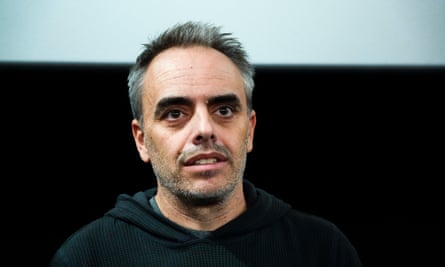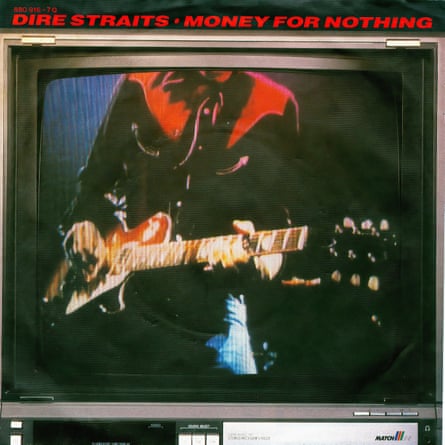I
At 4am on a Monday, the majority of Rio de Janeiro was asleep. However, in Morro do 77, a favela located on the rough west side of the city, the festivities were just starting. Hundreds of partygoers crowded the main street of the community, dancing and showing off their moves as they were surrounded by booming music from a three-meter wall.
Loud music filled the morning air as speakers and subwoofers blasted favela funk. Attendees drank small cups of whiskey and frozen coconut water at the party. With heads nodding, bodies moving, and windows trembling, the event’s surprising name appeared on a screen above the dance floor in bold British colors of red, blue, and white. It read, “The Baile de Londres” or “The Party of London.”
“One of the DJs, Hyago Domingos de Lima, mentioned that sometimes people head straight to work after the event,” he said. However, his loud setlist made it impossible to continue the conversation.
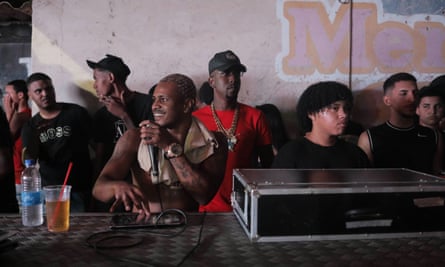
The Sunday night extravaganza, where attendees, including someone sporting a jersey from the England football team, boogied until 7am, is just one of many favela funk parties that have adopted names of cities and countries from around the globe.
Around five years ago, musicians in the Complexo do Lins favela in Rio started a trend with the creation of Baile da Colombia (Colombia’s Party). This name is a nod to the ongoing conflict in the neighboring country and the deadly violence that plagues many gang-controlled areas in Rio.
Event planners in favelas throughout the city consulted maps, hoping to increase their brand recognition and draw in larger crowds by featuring a foreign name.
In Chapadão, the event was called “Egypt”; in Parque das Missões, it was named “Poland”; and in Parque Arará, it was named “Portugal”. One favela chose to represent China and promoted their rave using the Chinese national flag. Another favela paid tribute to a local gangster who went by the name of Japan.
In the eastern satellite city of São Gonçalo, promoters selected various US cities such as New York, Brooklyn, and Las Vegas. In Rocinha, they honored Russia with the Baile de Moscow, while in Jacarezinho they organized the Baile de Paris.
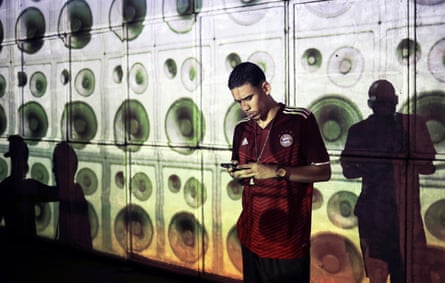
Kaio Gonçalves da Silva, a 26-year-old DJ, stated that there is a funk party named after every country in the world. He performs at parties named after Acapulco and Saudi Arabia in Duque de Caxias, a city north of Rio. He uses his customized Sonic the Hedgehog motorbike to travel between the two gigs, which only takes five minutes.
“There the Party of Canada. There’s Libya. There’s Korea … There’s Croatia. There’s Sweden. I think there’s an Italy one too … There’s Ireland. There’s Scotland,” said Da Silva, AKA DJ Kaio VDM, the composer of a recent hit celebrating the Brazil and West Ham footballer Lucas Paquetá.
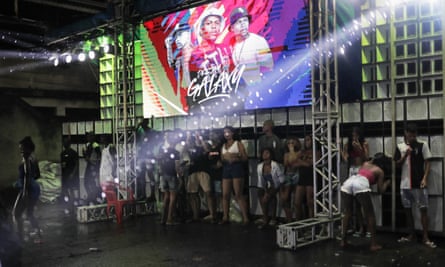
DJ and music producer Luiz Júnior, who hails from the westside favela of Vila Aliança, shared that when local musicians were considering adopting a country, there were not many options left. Ultimately, they chose Romania. Júnior admitted, “Honestly, I am not familiar with Romania. Many people here are not even aware of its capital city… [But] the flag’s colors were well-received by the community.” Júnior’s sound system, Ignorant, supplies large, specially-made speaker systems for events in countries such as Argentina, Mexico, and Iraq.
Lima, known by his DJ alias HG, conceived the idea for the Baile de Londres while casually chatting with his friends Fatty Psycho, Haze, Xiclaudio, and Big Dave at the main square of Morro do 77. They initially thought about holding the event in Guatemala, but then someone suggested England. However, Lima pointed out that the Portuguese word for England, Inglaterra, was too long and not suitable for MCs to announce. Therefore, they settled on Baile de Londres, resulting in a new rave in Rio with a UK theme. The promotional flyers featured images of the Houses of Parliament and the London Eye.
Lima, similar to many other residents of the favela, has never had the opportunity to travel outside of his home country. He acknowledged that his understanding of the capital city of the UK is limited. “When I imagine London, I picture the tall buildings and the lake with the bridge crossing over it,” he described Tower Bridge.
Marcelo Henrique dos Anjos da Silva, a renowned dancer known for his captivating performances at the Baile de Londres, has become a viral sensation on social media. Despite this, he often associates London with nothing more than cold weather. “It’s the type of city where you always need a jacket and scarf,” said Da Silva, who goes by the nickname ML, as he sat in Morro do 77’s plaza wearing flip-flops and shorts.
The establishment of the London Party has brought a distinctly British vibe to the Brazilian favela. The primary thoroughfare, Francisco Brício Avenue, has unofficially been called Retão de Londres, which loosely translates to London Street. A local soccer team was also formed last year, known as Seleção de Londres or Team London. In typical English fashion, they reached the finals of the favela’s yearly competition, but unfortunately, were defeated.
“We were beaten badly, like 4-0 or something,” remarked Pedro Gomes, a defender for the team, while proudly sporting his union-flag-branded uniform on the synthetic pitch in the favela.
Gomes, a goalkeeper for London’s team, also works at a hospital pharmacy. He believes that the baile, or dance party, is a crucial way for overworked residents in his underprivileged neighborhood to relax and have fun. “With all the work they do, it’s important for locals to have a way to enjoy themselves,” the 25-year-old stated as the massive sound system for the event was being set up outside the evangelical church Vida Em Graça (Life in Grace).
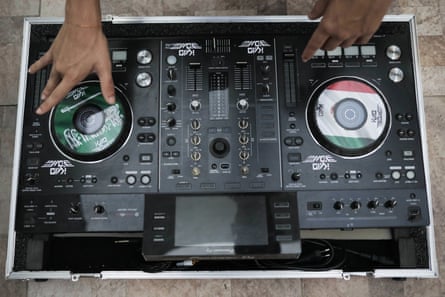
The musical genre of funk in Rio has faced criticism and negative labeling from both authorities and critics for promoting drugs, violence, and sexuality. However, there has been a shift in perception in recent times, with the movement now being recognized as a valuable cultural asset and even showcased in a prominent art museum in Brazil.
The events also serve as a vital source of income for the favelas in Rio, where approximately 20% of the city’s residents live. One day before the start of Baile de Londres, Adriana da Silva Lucena left her residence in Vila Ideal favela to sell beverages at Baile de Acapulco.
“Life is difficult for us, and without the baile, many people would be facing hunger,” stated Lucena, a 51-year-old single mother living in a community where numerous families rely on government assistance.
“It can be exhausting and overwhelming. After working all night, returning home feels like being dead,” she expressed about her overnight shifts. “However, I have a strong attachment to this community. Acapulco is my livelihood, whether I like it or not.”
“The owner of a clothing store in Vila Ideal, Wagner Oliveira, who is 32 years old and named his business after a popular Mexican vacation spot, stated, ‘There is a misconception that bailes are solely about drugs and drinking. However, these events actually bring many benefits to the community.'”
After becoming a born-again Christian, Oliveira stopped going to raves and did not enjoy the music and its sexually explicit lyrics. However, he recognized that these parties were a significant aspect of life in the favela. He believed that only those who live in the community truly understand their importance, while outsiders do not understand it at all.
Shortly after, the sound was amplified and guests started to show up for an evening of non-stop pleasure-seeking. Oliveira closed his store and went home, putting up Mexico’s Aztec-inspired flag in his shop front with a message to potential customers. “Will return shortly,” it read.
Source: theguardian.com









